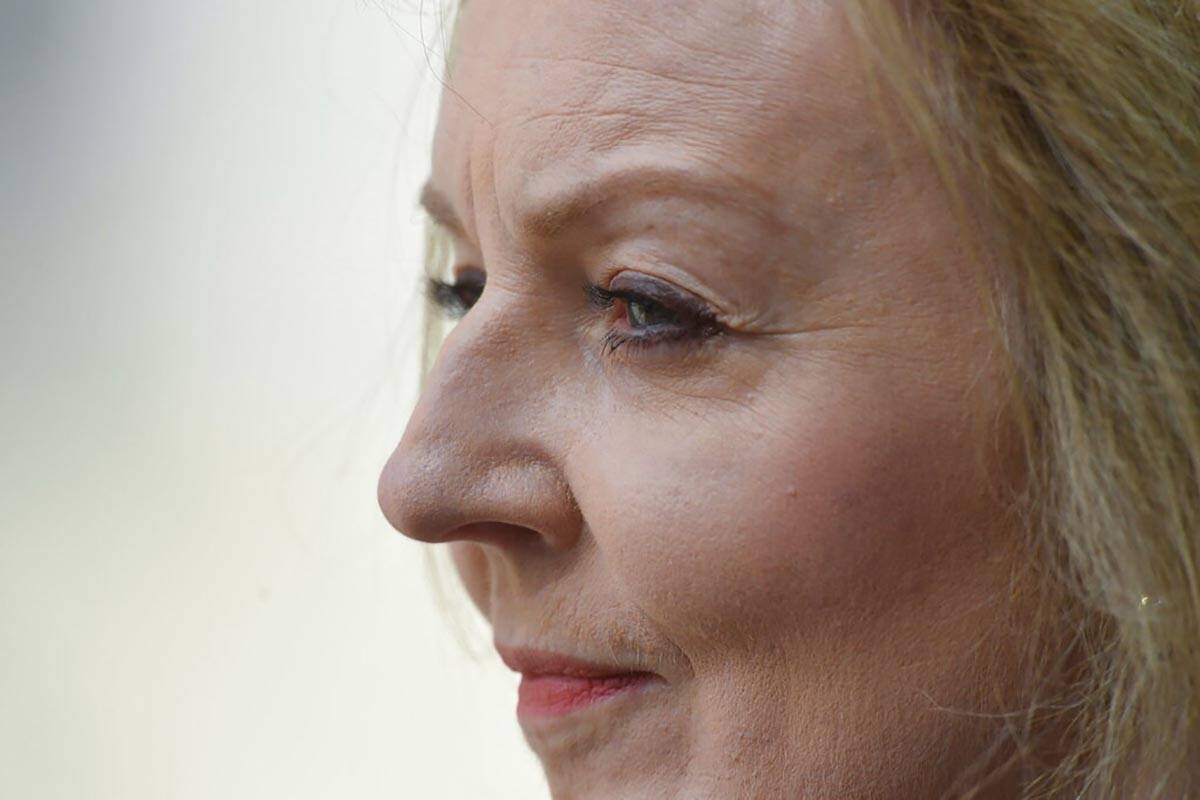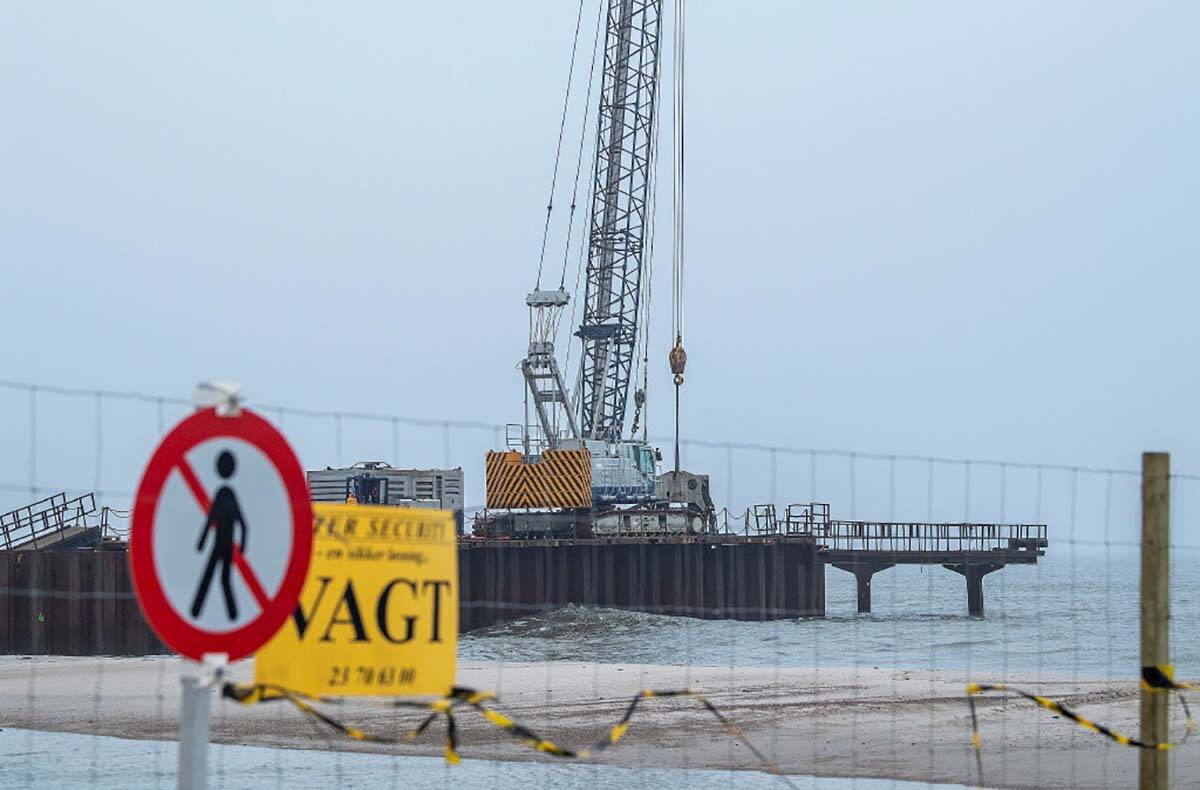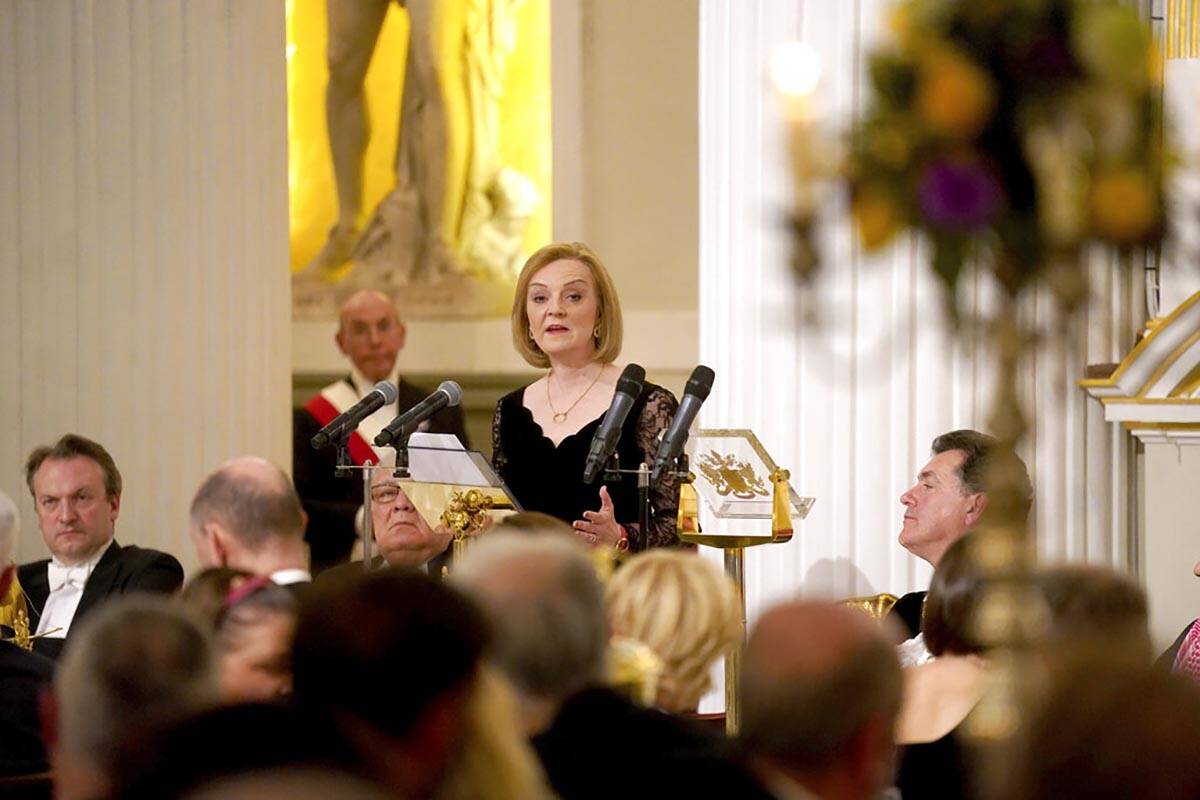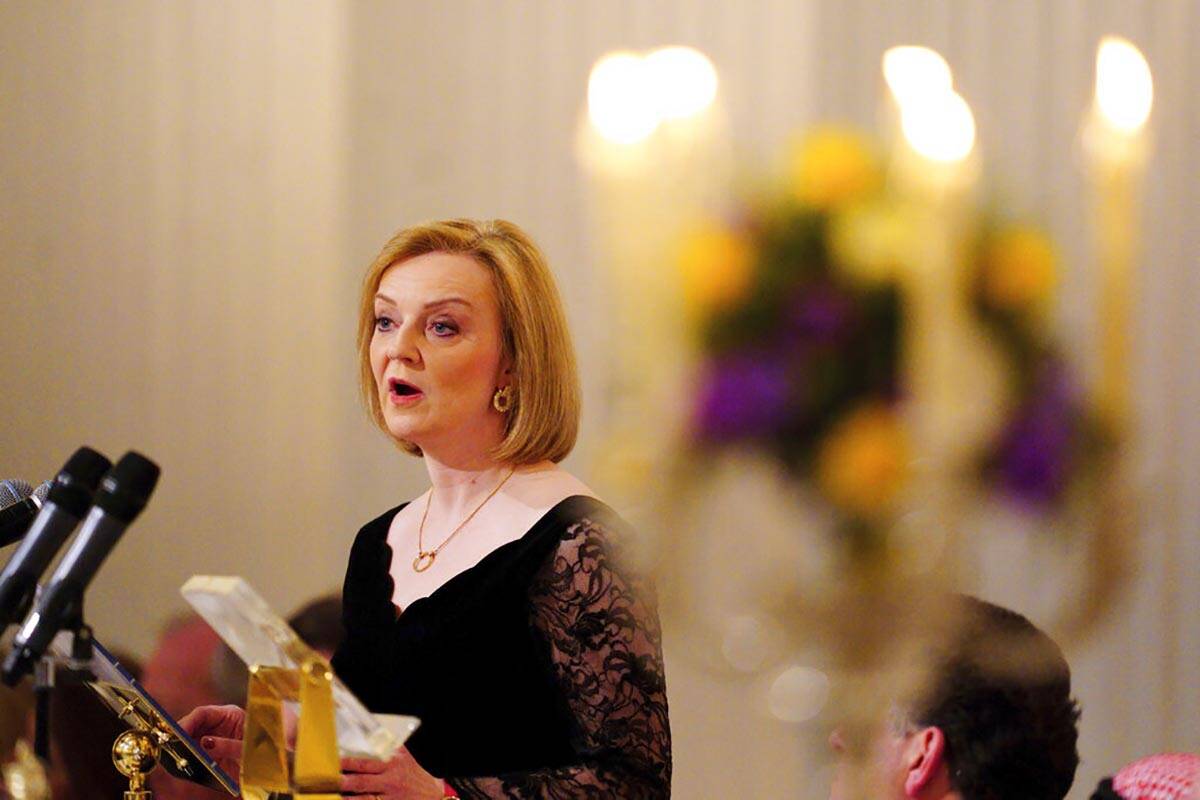UK official calls for more heavy weaponry for Ukraine
LONDON — Britain’s top diplomat called Wednesday for Western allies to send tanks, warplanes and other heavy weapons to Ukraine, saying fears of escalating the war were misplaced and “inaction would be the greatest provocation.”
Foreign Secretary Liz Truss said “this is a time for courage, not caution” among nations helping Ukraine fight Russia’s invasion.
“Heavy weapons, tanks, airplanes — digging deep into our inventories, ramping up production. We need to do all of this,” Truss said during an annual foreign policy speech at Mansion House, the residence of the Lord Mayor of London.
NATO nations have supplied Ukraine with military weapons and gear, including missiles and armored vehicles. But they have been reluctant to send fighter planes — despite pleas from Ukrainian President Volodymyr Zelenskyy — for fear of escalation. Russian Foreign Minister Sergey Lavrov has already accused NATO of effectively waging a proxy war against Russia.
Western officials deny that, saying the conflict is between Russia and Ukraine due to Russia’s illegal invasion of its neighbor.
Britain has sent 450 million pounds ($565 million) in military aid to Ukraine, including thousands of missiles. But Despite Truss’s call for jets, British Prime Minister Boris Johnson’s spokesman, Max Blain, said there were “no plans” for the U.K. to send planes. He did not rule out Britain sending planes to another country, such as Poland, that would then give its own jets to Ukraine, but said there were “no specific plans” to do so.
Unexpected prisoner swap
Russia and the United States have carried out an unexpected prisoner exchange in a time of high tensions, trading on Wednesday a Marine veteran jailed by Moscow for a convicted Russian drug trafficker serving a long prison sentence in America.
The deal involving Trevor Reed, an American imprisoned for nearly three years, would have been a notable diplomatic maneuver even in times of peace but it was all the more surprising because it was done as Russia’s war with Ukraine has driven relations with the U.S. to their lowest point in decades.
On the other end of the swap was Konstantin Yaroshenko, a Russian pilot who’d been serving a 20-year federal sentence for conspiring to smuggle cocaine into the U.S.
Even as the Biden administration trumpeted the swap, it made clear the resolution did not herald a broader breakthrough between the countries. Russian forces remain determined in their assault on Ukraine, the U.S. and Western allies continue to impose punishing sanctions and other Americans, including WNBA star Brittney Griner and Michigan corporate security executive Paul Whelan, still remain jailed in Russia.
The swap, the culmination of longstanding requests by both countries as well as private diplomatic wrangling, took place in Turkey when “the two planes pulled up side by side, essentially, and then they got out,” said Reed’s father, Joey.
“I think it’s going to really hit home for him and for us when we finally get to see him and touch him,” he said in an interview with The Associated Press.
Wake-up call
Truss said Russia’s attack on Ukraine must be a wake-up call for international institutions that failed to prevent the invasion.
“The architecture that was designed to guarantee peace and prosperity has failed Ukraine,” Truss said. “The economic and security structures developed after the Second World War and then the Cold War have been bent out of shape so far that they have enabled rather than contained aggression.”
Truss called Russian President Vladimir Putin a “desperate rogue operator” who was ripping up the global order and outfoxing international institutions.
“Russia is able to block any effective action in the U.N. Security Council,” where it has a veto as a permanent member, she said, adding that the Group of 20 club of wealthy and emerging nations “cannot function as an effective economic body while Russia remains at the table.”
In response, Truss called for a new focus on “military strength, economic security and deeper global alliances” among “free nations.”
After years of declining military spending in many countries, including Britain, she said NATO’s goal that countries spend 2% of gross domestic product on defense should be “a floor, not a ceiling.”
Truss also called for tougher economic sanctions on Russia, saying the West must cut off Russian oil and gas imports “once and for all.” That would be an easier thing to do for Britain than for many other European nations.
“If Putin succeeds, there will be untold further misery across Europe and terrible consequences across the globe,” she said. “We would never feel safe again. So we must be prepared for the long haul and double down on our support for Ukraine.”
Russia cuts off oil for Poland, Bulgaria
Russia opened a new front in its war in Ukraine on Wednesday, cutting NATO members Poland and Bulgaria off from its gas, a dramatic escalation in the conflict that is increasingly becoming a wider battle with the West.
One day after the United States and other Western allies vowed to speed more and better military supplies to Ukraine, the Kremlin upped the ante, using its most essential export as leverage. It then went even further, saying Russia could halt gas supplies to other European customers.
European gas prices shot up on the news that Poland and Bulgaria were cut off, a move that European leaders denounced as “blackmail.”
In a memo, state-controlled Russian giant Gazprom said it was cutting Poland and Bulgaria off from its natural gas because they refused to pay in Russian rubles, as President Vladimir Putin had demanded. The company said it had not received any such payment since the beginning of the month.
The gas cuts do not immediately put the countries into dire trouble since they have worked on getting alternative sources for several years now and the continent is heading into summer, making gas not as essential for households.
Still, it sent shivers of worry through the 27-nation European Union, which immediately convened a special coordination group to limit the impact of the move. And Kremlin spokesman Dmitry Peskov’s ensuing warning was sure to worry them even more. He told reporters that other European customers may be cut off if they also refuse to pay in rubles.
Russian claims
On the ground too, the geopolitical fight intensified, with the Russian military claiming Wednesday that its missiles hit a batch of weapons that the U.S. and European nations delivered to Ukraine.
A day earlier, explosions rocked the separatist region of Trans-Dniester in neighboring Moldova, knocking out two powerful radio antennas and raising fears the war could spill over Ukraine’s borders. No one claimed responsibility for the attacks — the second in as many days — but Ukraine all but blamed Russia.
And a Russian missile hit a strategic railroad bridge linking Ukraine’s Odesa port region to neighboring Romania, a NATO member, Ukrainian authorities said.
Just across the border in Russia, an ammunition depot in the Belgorod region was burning early Wednesday after several explosions were heard, the governor, Vyacheslav Gladkov, said on the messaging app Telegram.
Gazprom’s decision to cut gas to two European countries was another dark turn in the war, which has revived the geopolitical rifts of the Cold War, and it had an immediate impact. European gas prices spiked 25%, with benchmark Dutch futures jumping from around 100 euros per megawatt hour to around 125 euros.
Fatih Birol, the executive director of the Paris-based International Energy Agency, called the move a “weaponization of energy supplies” in a tweet.
“Gazprom’s move to completely shut off gas supplies to Poland is yet another sign of Russia’s politicization of existing agreements & will only accelerate European efforts to move away from Russian energy supplies,” he wrote.
EU Commission President Ursula von der Leyen called the move “yet another attempt by Russia to use gas as an instrument of blackmail.”
Bulgarian Prime Minister Kiril Petkov also called the suspension of gas deliveries blackmail and said it was “a gross violation of their contract.”
“We will not succumb to such a racket,” he added.
‘Historical turning point’
The stoppage marked “an historical turning point in the bilateral energy relationship” between Russia and Europe, said Simone Tagliapietra, senior fellow at the Bruegel think tank in Brussels.
On Tuesday, the U.S. defense chief urged Ukraine’s allies to “move at the speed of war” to get more and heavier weapons to Kyiv as Russian forces rained fire on eastern and southern Ukraine.
Poland, a historical rival of Russia, has been a major gateway for the delivery of weapons to Ukraine and confirmed this week that it is sending the country tanks. It said it was well prepared for Wednesday’s gas cutoff.
Poland also has ample natural gas in storage, and it will soon benefit from two pipelines coming online, analyst Emily McClain of Rystad Energy said.
Bulgaria gets over 90% of its gas from Russia, and officials said they were working to find other sources, such as from Azerbaijan.
Both countries had refused Russia’s demands that they pay in rubles, as have almost all of Russia’s gas customers in Europe.
Two months into the fighting, Western arms have helped Ukraine stall Russia’s invasion, but the country’s leaders have said they need more support fast.
Austin holds 40-nation meeting
U.S. Defense Secretary Lloyd Austin convened a meeting Tuesday of officials from about 40 countries at the U.S. air base at Ramstein, Germany, and said more help is on the way.
“We’ve got to move at the speed of war,” Austin said.
After unexpectedly fierce resistance by Ukrainian forces thwarted Russia’s attempt to take Ukraine’s capital, Moscow now says its focus is the capture of the Donbas, the mostly Russian-speaking industrial area in eastern Ukraine.
In the gutted southern port city of Mariupol, authorities said Russian forces hit the Azovstal steel plant with 35 airstrikes over 24 hours. The plant is the last known stronghold of Ukrainian fighters in the city. About 1,000 civilians were said to be taking shelter there with an estimated 2,000 Ukrainian defenders.
Petro Andryushchenko, an adviser to Mariupol’s mayor, said Russia was using heavy bunker bombs. He also accused Russian forces of shelling a route they had offered as an escape corridor from the steel mill.
Ukraine also said Russian forces shelled Kharkiv, the country’s second-largest city, which lies outside the Donbas but is seen as key to Russia’s apparent bid to encircle Ukrainian troops in that region.
Ukrainian forces struck back in the Kherson region in the south.
The attack Tuesday on the bridge near Odesa — along with a series of strikes on key railroad stations a day earlier — appeared to signal a major shift in Russia’s approach. Until now, Moscow has spared strategic bridges, perhaps in hopes of keeping them for its own use in seizing Ukraine. But now it seems to be trying to thwart Ukraine’s efforts to move troops and supplies.
The southern Ukraine coastline and Moldova have been on edge since a senior Russian military officer said last week that the Kremlin’s goal is to secure not just eastern Ukraine but the entire south, so as to open the way to Trans-Dniester, a long, narrow strip of land with about 470,000 people along the Ukrainian border where about 1,500 Russian troops are based.
It was not clear who was behind the blasts in Trans-Dniester, but the attacks gave rise to fears that Russia is stirring up trouble so as to create a pretext to either invade Trans-Dniester or use the region as another launching point to attack Ukraine.
___
Gambrell reported from Lviv, Ukraine. Associated Press journalist Yuras Karmanau in Lviv, David Keyton in Kyiv, Oleksandr Stashevskyi at Chernobyl, Mstyslav Chernov in Kharkiv, and AP staff around the world contributed to this report.

























